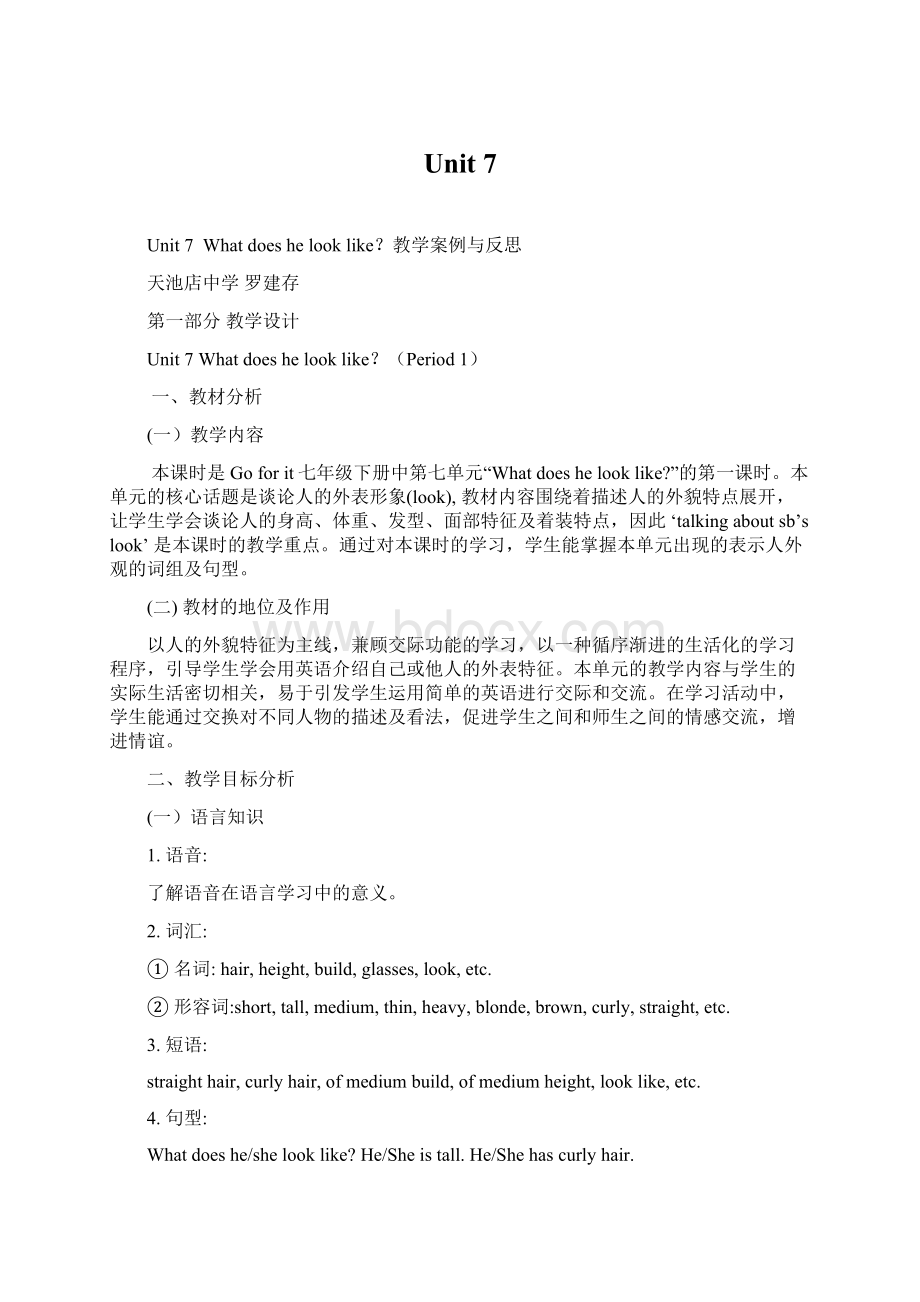Unit 7.docx
《Unit 7.docx》由会员分享,可在线阅读,更多相关《Unit 7.docx(14页珍藏版)》请在冰豆网上搜索。

Unit7
Unit7 Whatdoeshelooklike?
教学案例与反思
天池店中学罗建存
第一部分 教学设计
Unit7Whatdoeshelooklike?
(Period1)
一、教材分析
(一)教学内容
本课时是Goforit七年级下册中第七单元“Whatdoeshelooklike?
”的第一课时。
本单元的核心话题是谈论人的外表形象(look),教材内容围绕着描述人的外貌特点展开,让学生学会谈论人的身高、体重、发型、面部特征及着装特点,因此‘talkingaboutsb’slook’是本课时的教学重点。
通过对本课时的学习,学生能掌握本单元出现的表示人外观的词组及句型。
(二) 教材的地位及作用
以人的外貌特征为主线,兼顾交际功能的学习,以一种循序渐进的生活化的学习程序,引导学生学会用英语介绍自己或他人的外表特征。
本单元的教学内容与学生的实际生活密切相关,易于引发学生运用简单的英语进行交际和交流。
在学习活动中,学生能通过交换对不同人物的描述及看法,促进学生之间和师生之间的情感交流,增进情谊。
二、教学目标分析
(一)语言知识
1. 语音:
了解语音在语言学习中的意义。
2. 词汇:
①名词:
hair,height,build,glasses,look,etc.
②形容词:
short,tall,medium,thin,heavy,blonde,brown,curly,straight,etc.
3. 短语:
straighthair,curlyhair,ofmediumbuild,ofmediumheight,looklike,etc.
4. 句型:
Whatdoeshe/shelooklike?
He/Sheistall.He/Shehascurlyhair.
Whatdoyou/theylooklike?
I’mthin./They’reofmediumheight.
5. 语法:
①Yes/No问句及简略回答。
②wear的一般现在时用法。
③用于宽泛描述的形容词。
(二)语言技能
1.能熟练的用英语进行对人外表特点进行描述。
2.能概括人物的外貌特征并根据人物特征推理出某一人物。
3.能掌握本单元出现的表示人外观的词组及句型,并能结合实际生活进行灵活运用这
些词组及句型描述别人的外表,提高写作水平。
(三)情感态度
1.通过描述同学、教师或自己的偶像的外貌,简单地表达自己的观点或好恶,学会交
换不同的看法,使学生在人际交往中学会尊重和理解别人。
2.教育学生要多发现别人的优点,学会赞美别人,友好地描述别人的形象。
3.学会赏识,懂得心灵美比外表美更重要。
4.能在小组活动中积极与他人合作,相互帮助,共同完成学习任务,尽情享受学习
的乐趣。
(四)文化意识
了解不同人的外貌和同一人的不同外貌,了解中西方文化中在表达自己的观点时存在很大的差异,我们比较委婉,而西方人则更直接些,对学生进行不同文化意识的渗透。
三、教学重难点
通过学习语言材料,让学生获得运用所学的有关词汇,短语及句型,描述人的外貌特征,并能结合实际生活进行灵活运用的能力。
新词汇的运用,特别是has与is的正确使用,是本单元的一个难点。
单元教学重难点一览
重点
难点
1.Thevocabulary.
2.--Whatdoeshe/shelooklike?
--He/Sheistall.
--Whatdoyoulooklike?
--I’mthin.Ihaveshorthair.
Usethelanguagetotalkaboutsb’slook.
四、学情分析
学生在七年级上册已经学过关于“Whatdoeshelike?
”这一特殊疑问句式,具有了学习本单元知识的认知前提,能自然地与本单元话题进行衔接。
谈论人的外表形象是人们日常生活中遇到的话题。
故学生喜于用英语表达此类知识。
五、教学方法和学习策略
1. 教学方法:
①情景交际法:
本单元话题源自生活,立足这一点,充分利用学生已有的知识和经验,
创设生活化的真实情境,引导学生在运用中学习语言,然后在学习新的语言知识后创造性地运用语言(为用而学,在用中学,学了能用)。
②任务型语言教学法:
设计多种任务活动,提供给学生合作交流的空间和时间,促使
学生为完成任务和同学进行合作,为完成任务进行探究学习。
③开放性教学策略:
教师要开放性地处理教材,结合教材插入学生感兴趣的图片等,
丰富学生知识,拓宽他们视野,实现知识的整合。
2. 学习策略
①自主学习:
要求学生采用自主学习的方式,能根据需要进行有目的预习,使其对教
师的教学内容起补充作用。
②合作学习:
在与同学合作完成任务的活动中形成合作学习和探究学习的学习方式,
引导学生积极思考,善于抓住英语交流的机会。
在活动中相互探讨、相互交流、相互合作,从而获得知识、技能和情感体验,发展他们的能力。
③通过看图说话、听力训练、猜人物、情景对话等一系列活动,创设情景和有意义的
任务活动,激发学生的学习热情,培养他们的概括和推理能力,发挥他们自己的主观能动性,把被动的学习变为主动学习,让学生巩固所学语言知识。
主题语表
hair:
short,long,
curly,straight,
others:
wearglasses,
height:
tall,short,
blonde,brownetc
wearayellowT-shirt…
mediumheight
↖
↑
↗
physicalappearance
↙
↘
face:
beard,mustache,
build:
thin,heavy,
eye(bigblue..)etc
mediumbuild
∙
∙
∙
∙
∙
∙
∙
∙
∙
∙教学过程设计(Period1)
Step1 GreetingandSmalltalk
First,listentoalightmusic(幻灯片1),greetwithstudentsandhaveasmalltalk:
Then,tellstudentsthattodaywe'lllearnhowtodescribepeople'slooks.Andaskthemtoreadthetitle:
“Whatdoeshelooklike”(幻灯片2)andrememberthesentence.
Step2Leading-in
First,findtwostudents(oneisshortandthin,theotheristallandheavy)asmodelstostandbeforetheblackboard.
Then,teachthenewwords(tall,thin,heavy,short)bycomparingtheirlooks.
Third,theteacherstandsbetweenthetwostudentsandleadsstudentstosay:
“ofmediumheight,ofmediumbuild”.
Next,teach“longhair,shorthair,curlyhair,straighthair,black/brown/blondehair”.
Step3Presentation
First,Leadstudentstoaskaboutlook.:
“Whatdoyou/theylooklike?
Whatdoeshe/shelooklike?
”
Then,(toconsolidatethenewwords)askstudentstolookatthepicturesinthescreen(幻灯片3-5)andanswer“whatdotheylooklike?
”togetherfromheight,buildandhair.Atthesametime,tellthemtopayattentionto“is”and“has”.
Next,askstudentstoopenbooks,turntoPage42.Changethelistening2aintotheexercise.(幻灯片6)
Askthemtohaveathinkandcircle“is”or“has”in2a.(InordertoleadSstoconcludetheusageof“is”
and“has”:
is+adj,has+n)
Step4Challenge
Askstudentstotakeabreathandlearnaboutthechallengingrules(幻灯片7).
TaskOne:
GoodMemory(幻灯片8-11)
First,askstudentstowatchthepicturescarefullyandkeepthestarsinmind
Then,askthemtoanswerthequestionsaboutthestars'looks.(Givethestudents“smile”cardsandpraisethemwithdifferentsimplesentences)
TaskTwo:
SuperEar(幻灯片12-15)
Askthemtolisten,takenotesandanswerthequestions.
TaskThree:
GuessingGame(幻灯片16和幻灯片24-27)
Guessthepersoninthepicturewith“Ishe/she…?
Askastudenttoguess,othersdescribe.
Togivemorestudentstodescribe,eachstudentdescribesthepersoninthepicturewithonesentence.(Givethestudentsjoininginthegamesmilecards)
TaskFour:
SpokenEnglishShow
(幻灯片17)Accordingtothesceneteacherdesignedandtheusefulwordsandexpressionsoffered,ask
studentstohavearoleplay.Givethemrules:
“SsinGroup1makeaconversationbetweenpolicemanandson.SsinGroup2makeaconversationbetweenpolicemanandfather.SsinGroup3canmakeanyconversation.”
Asktwopairsofstudentstoact.(Policemanandson,Policemanandfather)
Givethemsomecommentsandsmilecardsafteracting.
Givestudentstwosampleconversationsandreadtheconversations.(幻灯片18-19)
Step5MoralityEducation(幻灯片20-21)
WatchavideoaboutYangGuang(ablindbuttalentedman).
Tellstudentsamoraleducation:
“Everyoneisspecial.It'snicetobeme.Don’tjudgepeoplebytheirlook!
”
Step6Homework(幻灯片22)
Askstudentstodescribetheirfavoriteteacheranddrawapictureofhim/her.
板书:
Unit7Whatdoeshelooklike?
HeightBuildHairtallheavylong/shorthair
shortthincurly/straighthair
ofmediumheightofmediumbuild
我的设计思路
本节课是“Whatdoeshelooklike?
”的第一课时,话题是谈论人的外表形象,教材内容围绕着描述人的外貌特点展开,让学生学会谈论人的身高、体重、发型及着装特点。
因此,在本课的设计中笔者首先通过一首令人放松的轻音乐的播放,让学生谈论对该音乐的看法,进而谈论音乐老师的外貌,从而自然而然地引入本课话题,轻音乐的引入既让学生更快进入课堂状态,又激发学生对本课话题的兴趣。
通过外貌差异较大的学生及笔者本人的外貌对比,导出本课新词汇及短语,让学生直观地记住新词汇,更易记忆。
通过幻灯片图片中具有代表性外貌特征的人物展示,引导学生正确运用谈论外貌方面的新词汇,这是由单词到句子的输入,并引导学生观察句子中has和is的使用,进而归纳二者的使用规律,发展学生的观察及归纳能力。
通过一系列的挑战活动将学生刚习得的的语言输入进行语言输出,活学活用于各个环节——“比记忆”,“比听力”,“猜猜看”,“现场口语秀”。
最后,通过一段关于盲人杨光的模仿秀视频,告知学生“每个人都是特别的,不要以貌取人,做自己最好”,培养学生要学会欣赏自己和别人的情感态度。
其中,“比记忆”环节既考验了学生的关注及记忆能力,又考察了学生对本课词汇及句子表达的掌握程度;“比听力”环节实际上是教材中2b的听力内容,但笔者将课本的听力题目转换成了简易的外貌问答题,培养学生由听到说的语言表达能力;“猜猜看”环节引入了学生身边老师,同学等熟悉人物的图片,要求学生尽可能地从多方面描述他们,进而让学生准确猜测这是谁,这一任务比前面的环节内容要更开放,能促使学生表达自身积累的语言知识,并培养学生的探究能力,同时让学生感知能用英语描述身边人的外貌是多么好的事,从而树立更大的自信;“现场口语秀”环节是联系生活情境所设计的对话环节,通过寻找失散的父亲和儿子,培养学生用所学的描述外貌的语言知识运用于类似的真实生活中,并根据实际情况拓展对话内容,将学生的所学真正的活学活用。
对于本节课,笔者除了精心设计各种激发学生兴趣的活动,调动学生的积极性,更是引导学生按照从词到句的输入再输出的规律,掌握本节课的目标语言,学中用,用中学,进而达到能说,会说,最终运用并拓展于真实的语言生活中,以期取得较好的教学效果。
第二部分 课堂实录
一、创设情境,导入新课
师:
(播放轻音乐)Doyoulikemusic?
Why?
Who'syourmusicteacher?
Isshebeautiful?
生:
…OurmusicteacherisMissGao.Sheisbeautiful.
师:
Yeah,todaywe'lltalkaboutpeople'slooks:
“Whatdoeshelooklike?
”(亮出标题).
First,let'sfindtwostudents(oneisshortandthin,theotheristallandheavy)asmodelstostandnexttome.
(问题引入)Boysandgirls,Isthestudenttallorshort?
Isheheavyorthin?
生:
…(引导学生说出描述外貌的新单词)heis short buttheotheris tall.He's thin buttheotherisheavy.
师:
NowI'mbetweenthetwostudents.I'mnotshortornottall.AndI'mnotthinornotheavy.Sohowcanyoudescribeme?
生:
(帮助学生说出)You're ofmediumheight andyou're ofmediumbuild.
师:
Ok,listen:
Ihave longhair.Boys,doyouhavelonghair?
”
男生:
No,wehave shorthair.
师:
Boysandgirls,Ihave curlyhair.Doyouhavecurlyhair?
生:
No,wehave straighthair.
师:
Andwhatcolorhairdoyouhave?
生:
Wehave blackhair.
师:
Yes,butIhave brownhair.Someforeignershave blondehair.
老师将以上下划线词汇板书到黑板上并带读:
Unit7Whatdoeshelooklike?
HeightBuildHair
tallheavylong/shorthair
shortthincurly/straighthair
ofmediumheightofmediumbuildblack/brown/blondehair
探究新知,强化词汇
师:
Doyouknowhowtoaskaboutlooks?
生:
(齐声)Whatdoyoulooklike?
Whatdoeshe/shelooklike?
Whatdotheylooklike?
师:
OK,nowlet'shavealookatsomepicturesandtellmewhattheylooklike.(多媒体演示)First.,fromheight,say“Whatdoeshe/shelooklike?
”(Yaoming,aladyandalittlekid)
生:
(齐声)Heistall.Heisshort.Andsheisofmediumheight.
师:
Then,frombuild,say“Whatdoeshe/shelooklike?
”(展示三位艺人的漫画头像,学生爆笑)
生:
(齐声)Sheisheavy.Heisthin.Andsheisofmediumbuild.
师:
Next,fromhair,say“Whatdoeshelooklike?
”(展示蜡笔小新的不同发型)
生:
(齐声)Hehasshortstraightblackhair.Hehasshortstraightblondehair.
Hehaslongstraightbrownhair.Hehaslongcurlybrownhair.
师:
NowOpenyourbookandlookat2aonPage42.Payattentionto“is”and“has”,andhaveathinkwhentousthem.
生:
is+形容词,has+名词
挑战活动,引人入胜
师:
Let'stakeabreath!
Therearemanytaskswaitingforyou.Canyougetmychallenge?
Herearesomeruleswhenyou'regettingmychallenge(幻灯片展示挑战规则).I'llgiveasmilecardtothestudentwhogetstherightanswer.Andthestudentwhogetsthemostcardswillgetabigprize.Areyouready?
生:
(心情既紧张又迫不及待)Yes,go!
活动一:
比记忆(GoodMemory)
师:
I'llshowyouthepicturesoffourstars.(幻灯片展示图片)Youonlyseethemonce,sowatchthemcarefullyandkeepthestarsinmind.Then,youshouldhandupandanswerthequestions:
①Whatdoesthepersonlooklikeinthefirstpicture?
②Whatdoesthepersonlooklikeinthethirdpicture?
③Whatdoesthepersonlooklikeinthelastpicture?
④Whoisthepersoninthesecondpicture?
Whatdoesshe/helooklike?
生:
(抢答)…
师:
Welldone!
Goodmemory!
Great!
Excellent!
(以不同的语言表达给予鼓励并赠予微笑卡)
活动二:
比听力(SuperEar)
师:
Nowletmecheckyourlistening.Whohassuperears?
Whilelistening,takenotes.Afterlistening,youshouldanswerthequestions:
①WhatdoesDavidlooklike?
②WhatdoesSallylooklike?
③WhatdoesPetelooklike?
生:
(举手抢答)